Blessed and Joyous Easter !
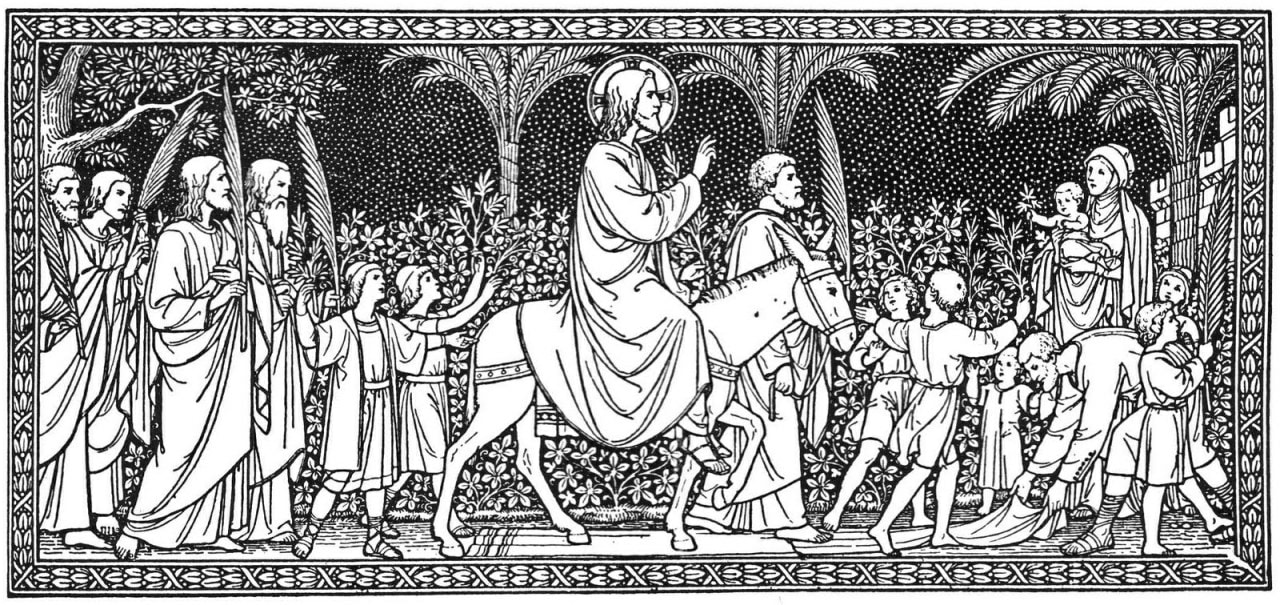 PALM SUNDAY opens the great week, or, as it is called by excellence, the Holy Week. It is so . . . called because it is in this week the grandest mysteries of our holy religion are accomplished. You cannot better enter into the spirit of the Church than by meditating each day on one of the circumstances of the Passion of our blessed Lord. Today let us enter the cenacle and consider the different circumstances associated with the institution of the most lovable and the most august of all the sacraments. The first circumstance which presents itself to your meditations is the strange command which Jesus gives to His apostles, viz., to prepare a room which shall be at once large and beautifully appointed. In fact, it is a strange command, since it is the first time that the divine Master shows that He is particular in the choice of a place which He shall honor by His presence. For a palace, He chose a stable; for a cradle, He selected a manger; for a refuge of His infancy, He is content with the house of a poor artisan; to offer His last sacrifice, a wooden cross sufficed. It is only now that He does not wish to appear poor. He wishes to surround His Eucharistic body with honors; and why? These surroundings are intended more for us than for Him. He wishes to give us a lesson. He teaches us that we cannot surround the Blessed Eucharist with too much respect or magnificence. He justifies His Church from the reproach of too much pomp, which unthinking men would make against her, and who would wish to see her offer the holy sacrifice under a roof of straw and in vessels of wood and potter's clay, while they themselves walk on richest tapestry and eat and drink from gold and silver vessels. Ah, if gold and silver were ever legitimately employed, it is certainly when there is question of erecting a throne to the God of the Eucharist and to heighten the splendor of its festivals. This has been the mind and conduct of all thesaints, and of all who have with David loved the "beauty of God's house." They have all considered it a duty and a joy to contribute to the ornamentation of the place which He has chosen to make His dwelling among men. St. Cajetan wished that the churches and the altars should be decorated with all possible splendor, and, in spite of his love for poverty, he sought for the richest ornaments, saying that nothing was too precious for the Lord of the world. Are these your sentiments? By this command Jesus warns us specially concerning the interior dispositions which we should bring to the reception of the Holy Eucharist. He asks that the room in which the institution of the Blessed Eucharist takes place should be grand and vast and spacious. But that which constitutes the grandeur of the heart are the exalted sentiments and a complete detachment from earthly things. Our souls ascend or descend with the objects which preoccupy them. If the soul habitually loves and seeks after what is beneath her, the weight of these things compel her to descend. There is nothing so little or contracted as a soul whose intelligence revolves habitually in the narrow circle of purely material interests. The ideas are narrow, the tastes are low, and the mind is frivolous; grand and serious thoughts are too heavy for such a soul to carry. Do you wish to possess a grand and noble heart? Then banish from it every earthly affection. Jesus can be but ill at ease in a heart which is also occupied by creatures. The throne of your heart is by far too beautiful to allow some earthly idol to possess it; He only is worthy to occupy it who has formed it by His own hands, and then can enrich it by His grace from the treasury of His virtues. When approaching the holy table, offer to your King, Jesus, a heart void of all earthly affection or whatever is purely human. If you would possess a truly great heart, let it be filled with a holy confidence. Confidence dilates the soul, unfolds all her faculties, and opens them to receive the dews of heavenly grace. It is precisely to facilitate this unfolding of the soul when approaching the holy table, that Jesus veils there His majesty under the Eucharistic species, and invites us in words that are full of tenderness : " Come, My well beloved, and eat the bread which I have prepared for you, and drink also of the wine; be inebriated by the delights of My table. Oh, with what ardor I have desired to eat of this Pasch with you!" How then can you be wanting in confidence when Jesus calls you to Him with so much goodness? Not only does Jesus wish a room vast and spacious, but also beautifully adorned. If your soul should be a dwelling-place worthy of God, she should be adorned with many virtues. This is a necessary condition for a worthy and fervent communion. And you know what these virtues should be: you should possess a lively faith, which shall present to you Jesus, true God and true man, under the sacred veils which hide Him from your corporal eyes—even as He was in the crib, when He received the adorations of the shepherds and the wise men; and even as He is in heaven, where He offers to His Father for you the wounds of His sacred humanity, the scars of which are still evident. While approaching the holy table, let your soul be filled with an ardent charity. The Eucharist is by excellence the sacrament of love. Love begets love. When Jesus opens His heart for you with unspeakable tenderness, should you close yours to Him? What to Him are your protestations, your words of devotion, your sterile assurances? It is your heart that He desires, and it is your love He yearns for. He says to you, with an incomparable sweetness: " My son, give Me thy heart." I ask it of thee, not as the world asks it, to fill it with trouble, agitation, and often remorse; but I ask it that I may bless it, purify it, and enrich it with My graces. "My son, give Me thy heart." What an enemy you shall be to yourself if you refuse to give it! To a lively faith and an ardent charity add a profound humility. Alas, who are you to merit the distinguished honor which awaits you at the holy table? Moses, while thinking that he was only"dust and ashes," was astonished that God should hear him; St. Elizabeth, on seeing the Blessed Virgin, who had come to visit her, exclaimed: "Whence is this to me, that the Mother of my God should come to me?" The centurion acknowledged he was unworthy to receive Jesus in his house. But it is in your heart that Jesus is going to descend; He is about to unite Himself to you, and you to Him. Even were you an angel, you could not sufficiently merit such a favor. But oh! how far you are from being an angel! These preparatory dispositions for communion are indicated to us by a circumstance in which Jesus gives us at once the example and the precepts. Before the mysterious repast at which the Blessed Eucharist was instituted, He put aside His garments, and, after having girded Himself as the servants do, He washed the feet of His apostles. What a lesson for us who are so jealous of our rank and dignity, so particular concerning precedence, and so desirous of honor ! The God of heaven and earth is on His knees before His apostles, washing their feet with those hands which can hurl the thunders, heal the sick, and lavish blessings. And Peter, at the sight of his Master's conduct, is seized with a holy indignation. "What ! Lord, Thou wash my feet! I shall never permit Thee." Peter fully realized the dignity of his Master, says Bossuet, and he only wished to hinder Him because of the lowliness of the ministry which He performed; he did not understand that this was, for him, an indispensable preparation for the Holy Eucharist, and that he could not participate in it unless his body and his feet also were purified ; that is to say, that the least stains, as well as the greatest faults, must be wiped away. But scarcely has Jesus declared to him that without this preparation he should have no part in His kingdom, than he exclaimed with greatest fervor: "Ah, Lord, wash not only my feet, but my hands and my head. Purify me wholly." From this let us learn with what purity we should approach the holy table. After having effaced our grievous faults, do not neglect those which are venial. You have been purified in the sacred waters of penance, but we have something yet to do. Besides those sins which kill the soul, there are others which disfigure it, and these also must be effaced. Then, before approaching the holy table, repeat with St. Peter: "Lord, my God, wash me, my feet, my head, my hands, that nothing in me shall be displeasing to Thy eyes, that I may be pure and without stain, to receive Thee into my heart, God of purity!" Source: Short Instructions on the Feasts of the Year, Imprimatur 1897 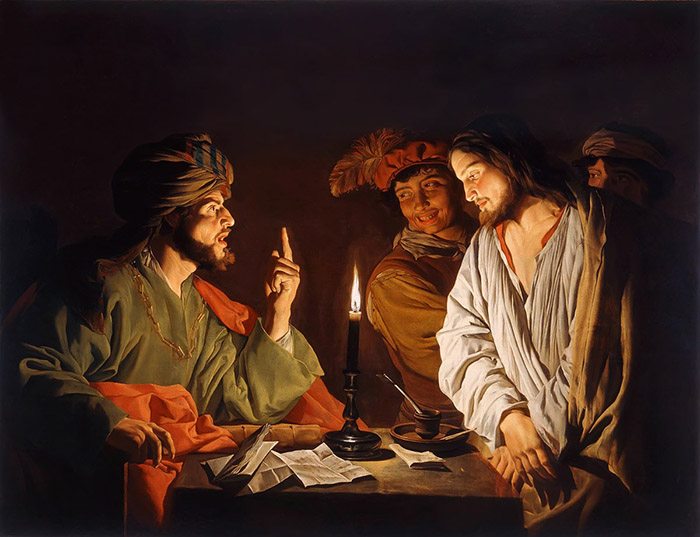 THE noble assurance with which Jesus defies His enemies to accuse Him of sin furnishes us an . . . occasion of meditating on the beautiful character of the Saviour of men. You shall find in it one of the most striking proofs of His divinity. It shall be sufficient for us to propose these two questions:Is Jesus, as He said, the Son of God? and, is His testimony true? First Point.—In order to escape from the crushing proof which follows from the testimony of Jesus in favor of His divinity, the infidels pretended that Jesus said He was, indeed, the envoy of God, but that He never affirmed that He was God. To demonstrate the falsity of this assertion, we have only to open the Holy Gospels. Jesus there gives testimony to His divinity at first in presence of His friends and disciples. One day, while speaking with them, He asked: "Whom do men say that I am?" The disciples answered: "Some say that Thou art John the Baptist, others that Thou art Jeremias, others that Thou art Elias, and others still that Thou art one of the prophets." But Jesus again asked: "Whom do you think I am?" Then Peter answered: "Thou art Christ, the Son of the living God." Instead of reproving him or correcting Peter's statement as a blasphemy, Jesus replied to Peter: "Blessed art thou, Simon, son of John, because flesh and blood have not revealed this to thee, but My Father who is in heaven." In another circumstance, Philip said to Jesus: "Lord, show us the Father and that will satisfy us." But Jesus, being indignant at this request, answers him: "What! I am so long with you, and you have not known Me, Philip? He who sees Me, also sees the Father. How then can you say, show us the Father; do you not believe that I am in the Father and the Father is in Me?" On another occasion, always wishing still more to affirm His divine affiliation, He said to one of His disciples: "God has so loved the world that He has sent His only Son, that he who believes in Him shall not be condemned, but he who does not believe in Him shall be condemned, because he does not believe in the name of the only Son of God." Jesus, therefore, proclaimed Himself as the Son of God, and in the strictest sense He claimed that He was in the Father and that the Father was in Him; and that to see Him was to see the Father. The testimony which Jesus gives of His divinity to His friends and to His disciples is evident. The testimony which He gives of Himself in presence of the people is no less evident and no less explicit. The multitudes which surrounded Him exclaimed: "How long shall you keep us in suspense? If you are the Christ, tell us clearly and openly." Jesus answers them: "I speak to you and you do not believe Me. The works which I have done give testimony of Me. My Father and I are one." At this statement, which told everything, the Jews gathered stones to throw at Him. And Jesus said to them: "I have shown you the works of My Father; for which of these works do you cast stones at Me?" The Jews answered: "For none of Thy works, but because of Thy blasphemy; because, being only a man, Thou hast made Thyself God." The language of Jesus before the people had the same signification as the language before the disciples: He clearly and unmistakably declared, "My Father and I are one." But Jesus is cited before the council of the ancients, the priests and magistrates of Judea. After testimony more or less inconsistent, the high priest puts the question squarely; he arises and addresses the accused this solemn adjuration: "I adjure you by the living God, to tell us, if you are the Christ, the Son of God." And Jesus answered him by these two words: "I am." And to confirm His avowal He immediately added: "I am He, and you shall see the Son of man seated at the right hand of the power of God, and coming in the clouds of heaven." So that before His friends, before the people, and before the magistrates, Jesus proclaimed Himself the Son of God, the only Son, the Son equal to His Father, one with His Father, and being in His Father and His Father in Him. This is the testimony which Jesus gives of Himself. And what a testimony! Only to think! a man, a being of flesh and blood, who has before Him not only the weakness of life but the weakness of death,-- a mere man,—and He dares to proclaim Himself a God! It is the first time in the history of the world that it has ever happened! It is evident that a mere man is not capable of such bold falsehood. Second Point.—But is the testimony which Jesus renders of Himself true? To doubt it, we must accept one of these two propositions: either Jesus did not believe what He said, or He believed it without being what He declared Himself to be. In the first supposition, He would be deceitful, since He proclaimed Himself for what He was not; in the second supposition he would be insane, since, being only a man, He believed Himself a God. In both suppositions we are presented with an impossibility. It is impossible to make of Jesus a deceitful man. According to the avowal of all, even of those who do not believe in Him, Jesus is a good and wise man, a man of incomparable character. He has done so many wonderful things, such holy things, that even His very enemies always pay homage to His works and to His person. If the world has seen black and impious spirits who have dared to blaspheme against His innocence and to confound Him with seducers, they have been only some monsters whom the whole human race has held in horror, and whose names, too odious to every nature, have remained buried in the same darkness from which their impiety came. In fact, what man had ever appeared with more incontestable characters of innocence and sanctity than Jesus the Son of the living God? In what man was ever observed so much love for virtue, so much sincere contempt for the world, so much charity for men, and such indifference for all human glory? Follow in detail His conduct and manners, and see if there has ever appeared on earth a just man more universally exempt from all the weaknesses which are inseparable from humanity. The more you observe Him, the more His sanctity shines out luminously. His disciples, who watch Him closely, are struck by the innocence of His life; while familiarity, which is so dangerous even to heroic virtue, serves only to discover, every day, new wonders in Him. When He speaks it is only the language of heaven, and He responds only when His answers may be useful for the salvation of those who interrogate Him. We never see in Him some intervals when the man asserts himself; but everywhere He appears as the envoy of the Most High. His most ordinary actions are exalted by the sublimity of the dispositions which accompany them; and never does He appear less a divine man than when He eats in the house of a Pharisee and when He calls Lazarus back from death to life. Jesus, therefore, is not and could not be a deceiver. But was He demented? This supposition is such an absurdity that it is revolting; and in; presence of the sublimity of His doctrines, which have won the admiration of every age; in presence of the purity of His moral teaching, which could not be equalled in the most beautiful pages that ever came from the hands of man; in presence of that wisdom which marked all His works, which dictated all His responses, a wisdom which sanctified all His acts and confounded the perfidy of His enemies. No, Jesus was not demented. He was not guilty of a horrible falsehood. He said He was God, and therefore He is God. O my adorable Master, I love to recognize Thee as the Messias promised to Adam, as the Saviour of the world, and as the immortal King of ages. Thou art more than a great genius, more than Elias, more than a prophet, more than a divine man. Thou art the Son of the living God! Do not permit that anything in the world should ever disturb my faith or take from me Thy love. Source: Short Instructions on the Feasts of the Year, Imprimatur 1897 We are having a 10% off sale on any of our doll outfits and accessories, now through April 13th! You can find our shoppe here. We are working on a few more saint outfits for these dolls. Sister Cabrini, Blessed Imelda, Saint Nicholas, Saint Michael and a new Saint Joan of Arc, complete with armour! We'll give you a couple sneek peeks in another post.
|
Holy Mother Church
dedicates the month of July to the Most Precious Blood of Jesus COPYRIGHT
The purpose of this website is to share the beautiful Catholic resources that God has so richly blessed us with. All texts unless they are my own words have their sources quoted, and most of them are in the public domain. Any educational items that I have made for or with my children are NOT TO BE USED FOR PROFIT, but are meant to be used for personal use by individuals and families. You may link to our site if you so choose. A Saint for everyday and good reading at:
Archives
July 2024
|
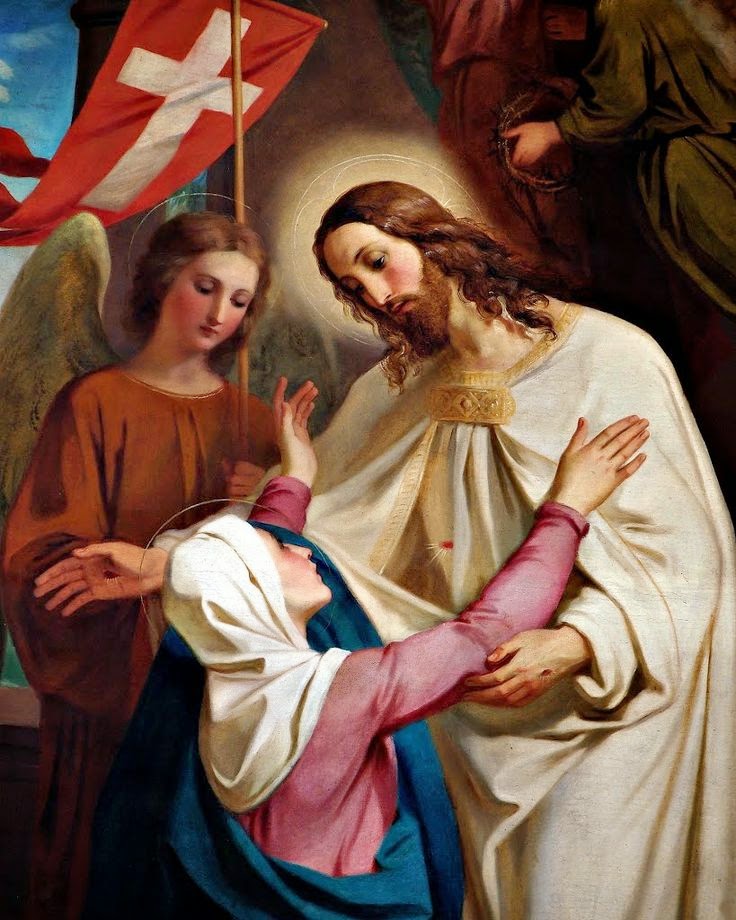

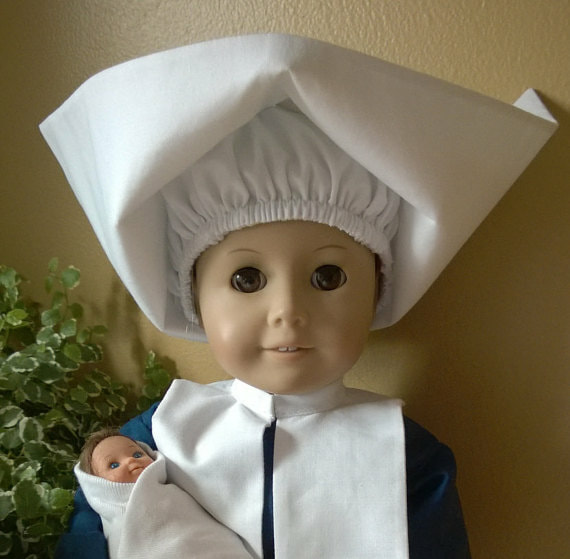
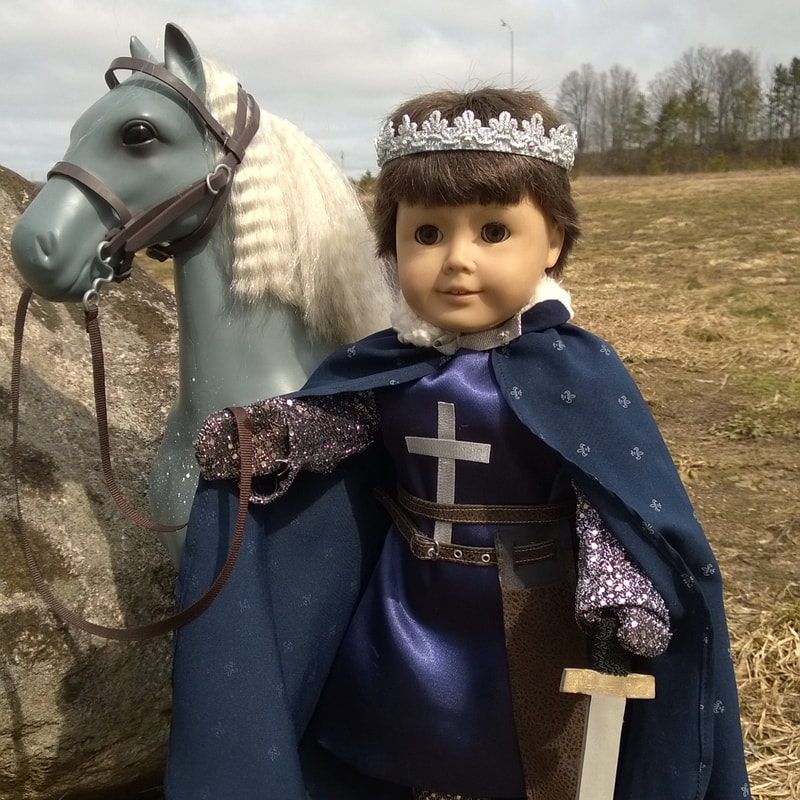


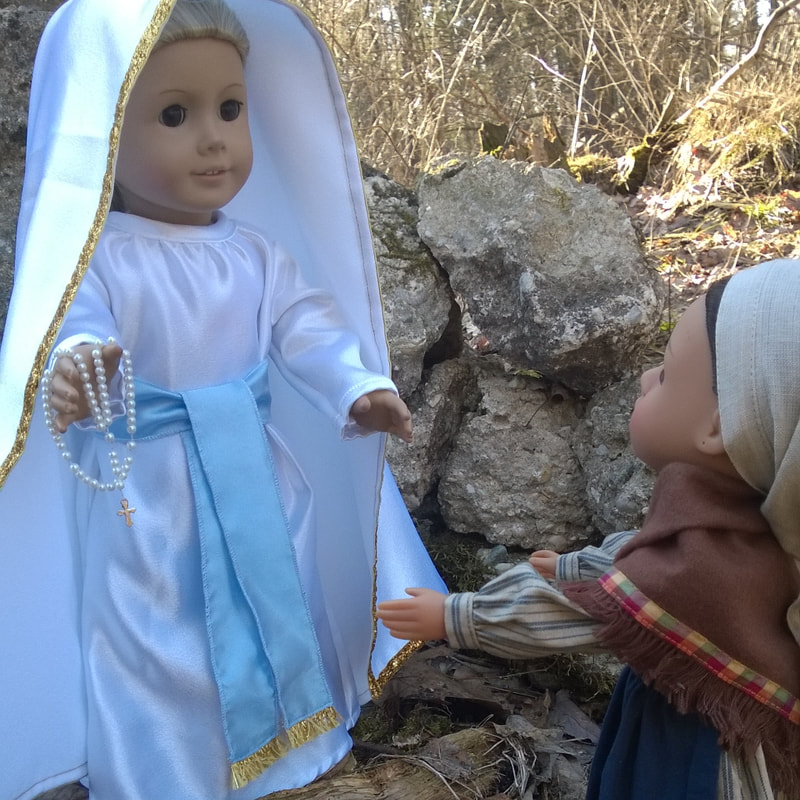

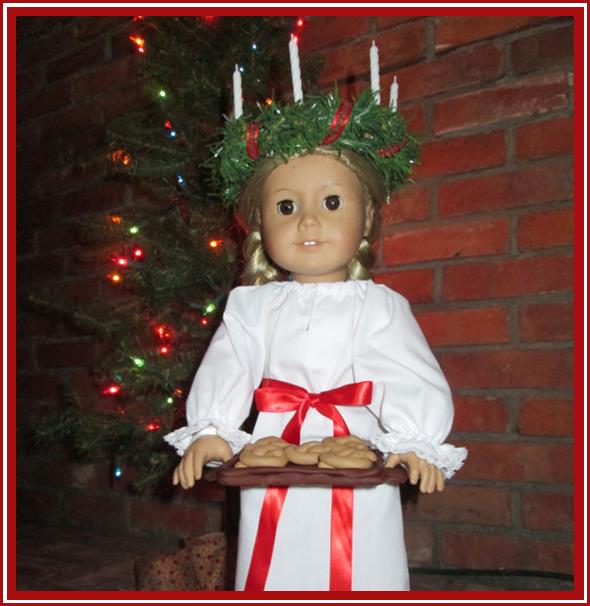
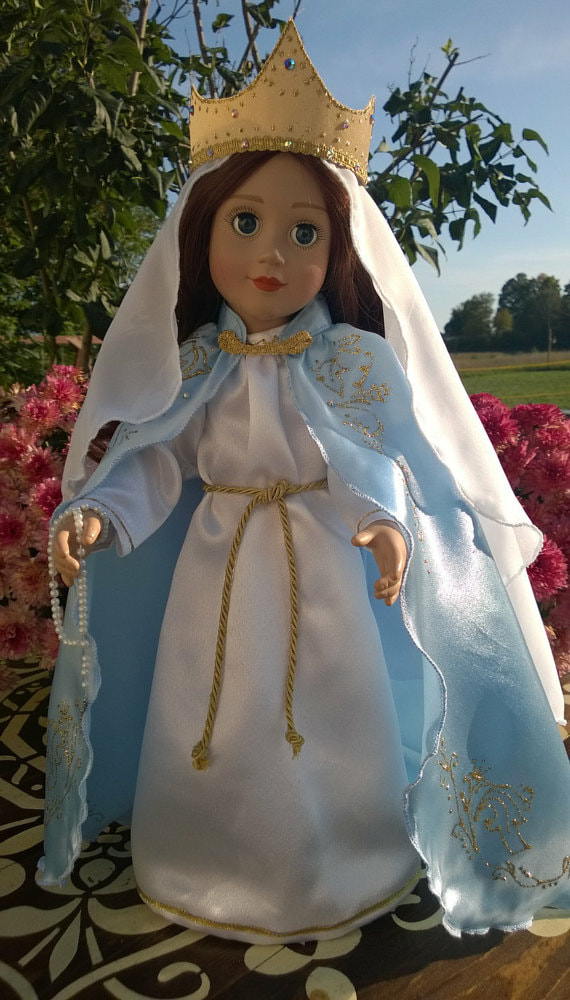
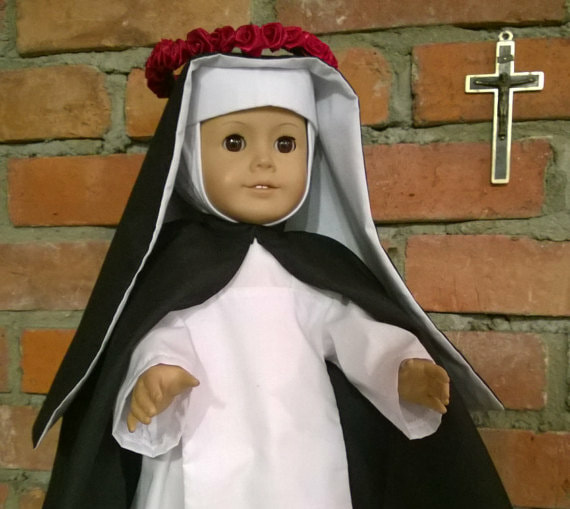
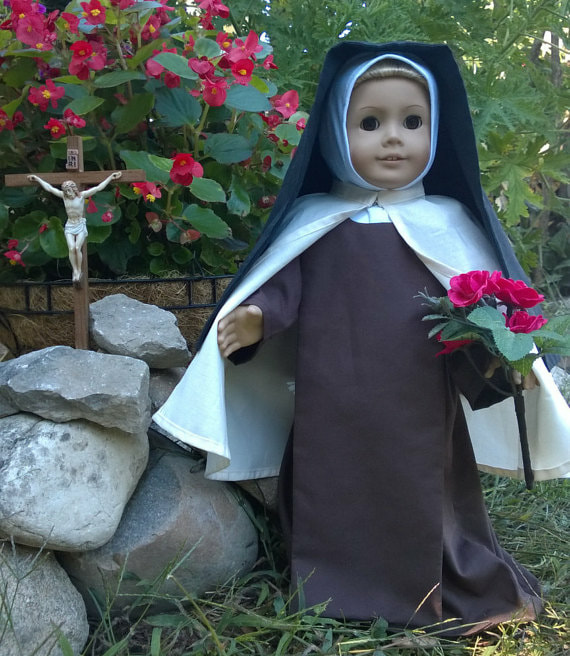


 RSS Feed
RSS Feed